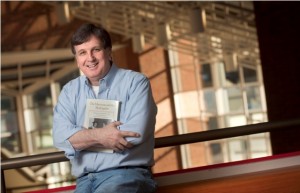
Professor Anthony Cummings
Anthony Cummings, professor of music, is writing a biography on internationally renowned Italian musicologist Nino Pirrotta, and what better place to study his subject than in Pirrotta’s homeland?
Cummings will spend the 2011-12 academic year on sabbatical in Italy working on the biography and other research. During the fall semester, he will be a visiting professor at Villa I Tatti, The Harvard University Center for Italian Renaissance Studies in Florence. Earlier in his academic career, Cummings spent time at Villa I Tatti as a fellow, and he is looking forward to returning in this new capacity. He has also served on the Academic Advisory Committee for Villa I Tatti, helping to select the fellows hosted there each year.
“It has a splendid library and a community of scholars who all work on the Italian Renaissance,” Cummings says. “Their input will be invaluable to the Pirrotta biography.”
In the spring, Cummings will most likely be a resident at the American Academy in Rome. There he will have access to the library and conservatory, where Pirrotta spent time before embarking on a teaching career at Princeton and Harvard universities, and the University of Rome, where Pirrotta taught after Harvard.
Cummings also has a new book coming out this year from The University of Michigan Press. The Lion’s Ear: Pope Leo X, The Renaissance Papacy, and Music is an attempt to reconstruct and describe what musical life was like in Pope Leo’s court.
Leo X, son of the legendary Lorenzo de’ Medici, was one of the greatest patrons of music in European history.
For source material, Cummings used correspondence written by diplomats who had been sent to the papacy by aristocratic lords and ladies at other Italian courts. Cummings says that although these envoys weren’t specifically interested in music, their correspondence captures vivid and evocative details about the musical performances they witnessed.
“They are anxious to provide their employers with as complete an account as possible of what was happening at Leo’s court,” he says.
Cummings has been using material gathered for this book in the classroom, helping to illustrate how music was integrated into daily life during the Renaissance period.
“What I try to do in my classes is bring this world alive for my students,” he says.
The Medicis have been the subject of much of Cummings’s work, and another upcoming book project will be a comprehensive study of the powerful family as patrons of music. He and co-author Blake Wilson, professor of music at Dickinson College, will explore the relationship between the Medicis and music, as other writers have done for the Medicis and art and the Medicis and banking.
Cummings is the author of several other books including The Maecenas and the Madrigalist (2004), Music in Renaissance Cities and Courts (1996), and The Politicized Muse: Music for Medici Festivals, 1512-1537 (1992).
